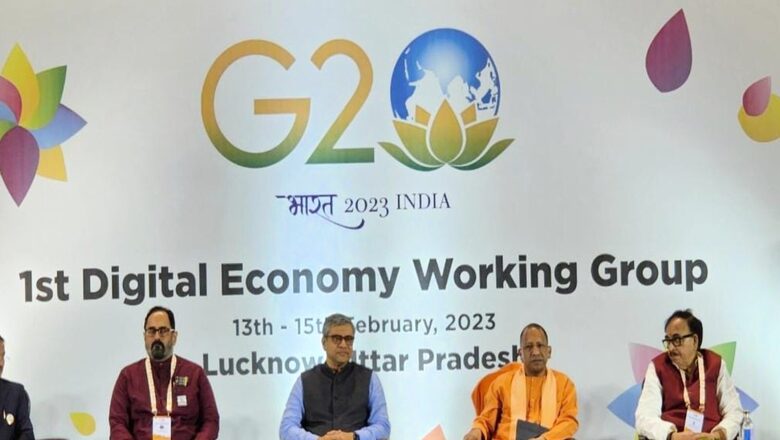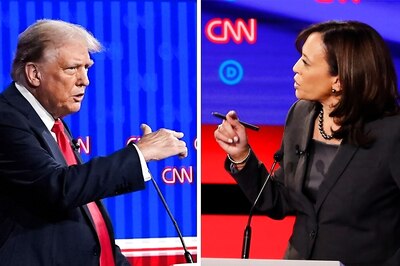
views
The first Digital Economy Working Group (DEWG) meeting under India’s G20 Presidency was held in the city of Lucknow last week, where important issues related to the use of digital technologies in contributing to the global economy were discussed. The concept of ‘digital economy’ remains abstract, even with more and more sectors of the economy moving to the digital realm.
The G20, especially, has taken note of this and has added digital economy to its main agenda, with a separate working group being created (upgraded from the previous task force) under the Indonesian Presidency in 2022. It started with a Digital Task Force in 2016, created under the Chinese Presidency, and the first-ever meeting held in 2017 under the German Presidency. One of the important issues which has been a central theme to the group’s initiatives is how to measure the digital economy and what constitutes it. However, since the Covid-19 pandemic, the growth of the digital economy has seen an incredible rise in enhancing the priority of the G20 towards this domain.
But why has the G20 dedicated a working group towards the digital economy? What has been the agenda for the group, and what has the G20, as a collective group, focused on centrally in the last few years that emphasises the importance of this working group?
Protecting Businesses and Consumers
With the growth of the digital economy, there is a rise in the number of stakeholders involved in securing the realm. This includes more businesses (big and small) shifting their operations to the digital world. It also includes the number of actors accessing and using digital spaces for acquiring products and services. The rise of e-commerce, app-based cab services, grocery shopping and movie ticket booking, among many other sectors, has seen an influx of consumers in the digital economy. Vulnerable groups of actors, such as children and senior citizens, are also active consumers in the digital realm now.
This makes the security of the digital economy essential to its smooth functioning. G20 members, in particular, have focused on security in the digital economy in both the pre and post-pandemic years. Under the Italian Presidency in 2021, the G20 members deliberated on using distributed ledger technologies or blockchain to ensure security, transparency and accountability for both consumers and businesses such as the Ministry of Micro, Small & Medium Enterprises (MSMEs). The Cybersecurity Dialogue, held under the Saudi Arabian Presidency, highlighted the importance of ensuring security in the digital economy as a risk management strategy for MSMEs and other small businesses.
On the individual front, the G20 launched the ‘Toolkit for Protecting Digital Consumers’ in 2018 and held the G20 Consumer Summit to empower and protect the most vulnerable and disadvantaged consumers under the Argentine Presidency. With a steep rise in the use of digital marketplaces during the pandemic, the G20 in 2021 recognised the need to focus on consumers’ awareness and empowerment.
Hence, the DEWG, under the G20, has focused extensively on highlighting the need to protect such small businesses, big firms and all the consumers actively involved in interacting with the digital economy.
Bridging the Digital Divide
Another aspect of the digital economy remains the ability to interact with the digital space. With connectivity to the internet and accessibility to basic digital products and services still remaining as development barriers, the growth of the digital economy needs to be complimented by removing such barriers. The G20, especially under the DEWG, has raised this as an important issue dating back to the creation of the task force in 2016.
The aspect of the ‘digital divide’ can be seen through multiple lenses. One, it emphasises the gap that exists between the developing and developed world in accessing and using digital products and services. Two, it exposes how individuals in different socio-economic strata can fully leverage the digital economy. Three, it touches upon the gender gap and the gap that exists between individuals belonging to vulnerable groups and others. Hence, bridging the ‘digital divide’ addresses multiple issues and ensures equitable growth of the digital economy.
The initiatives of the G20 in the last five years have showcased its intent towards solving each of the challenges posed by the digital divide. The G20 has also highlighted the primacy of improving digital literacy, skills, capacity, and human capital to enable individuals in employment and help new businesses (particularly MSMEs) leverage the benefits of the digital economy. The German Presidency, in 2017, kickstarted the #eSkillsforgirls initiative with the goal of digitally upskilling women and girls for improved female labour force participation. Under the Argentine Presidency in 2018, the then-task force noted the importance of bridging the digital divide (with the advent of AI and other emerging technologies) to improve employment opportunities and remain competitive for the ‘Future of Work’ era when automation and technology will play a major role.
How will India’s Agenda Shape Up?
The first DEWG meeting under the Indian Presidency concluded in the third week of February this year. As per the press release by the Press Information Bureau, deliberations centred around three main priority areas: Digital Public Infrastructure (DPI), Cybersecurity in the Digital Economy and Digital Skilling.
The digital economy is especially important for the Indian economy in the coming years. Official figures from the Reserve Bank of India (RBI) stated that the country’s digital economy grew 2.4 times faster than the overall economy, with strong forward linkages to non-digital sectors. The report also emphasised that around 62.4 million (11.6 percent of the national workforce) workers are employed in the overall digitally dependent economy. The ‘Digital India’ campaign, kickstarted in 2015, is now reaping dividends for the country with the impressive growth of the domestic digital economy.
Considering India’s priorities for this year, the presidency has taken a quasi-ambitious approach to the working group. The introduction of DPI is a first for the working group at the G20 level. The ability of DPI to contribute to the digital economy, such as financial inclusion (in the case of UPI) and direct benefits transfers (in the case of Aadhaar) presents a wonderful case study for how G20 can leverage such ecosystems to effectively transform their own digital economies. But considering many of the G20 member states do not utilise DPI at the national level and some are not aligned with the Indian model of such digital infrastructure, the DEWG will need to drill down to the basics of what constitutes such ecosystems and what does not.
While securing the digital economy has been discussed before in the G20 forum, the focus has been on upskilling small businesses and MSMEs to deal with potential threats in cyberspace. India’s Presidency and the DEWG agenda seek to align with previously set goals in the domain. The concept of Digital Skilling, however, has been a consistent theme across the working group for the last few years. The Indonesian Presidency, in 2022, also released a ‘Toolkit for the Measurement for Digital Literacy and Skills’, which sought to understand the level of digital literacy in a society before deciding to introduce digital skilling programmes. India’s Presidency can carry forward this initiative and seek to focus on digitally skilling populations to improve employment outcomes.
The DEWG remains one of the core working groups in the G20 in which India can make an actual impact during its Presidency. Through India’s achievements in the field of DPI, its focus on securing the digital economy and its vision for carrying forward previous G20 initiatives on digital skilling, the DEWG, under the G20 in 2023, looks to achieve clear-cut tangible outcomes which will set the precedence for future G20 presidencies.
Arjun Gargeyas is an IIC-UChicago Fellow and a Consultant at the Ministry of Electronics and Information Technology (MeitY), Government of India. Views expressed are personal.
Read all the Latest Opinions here




















Comments
0 comment